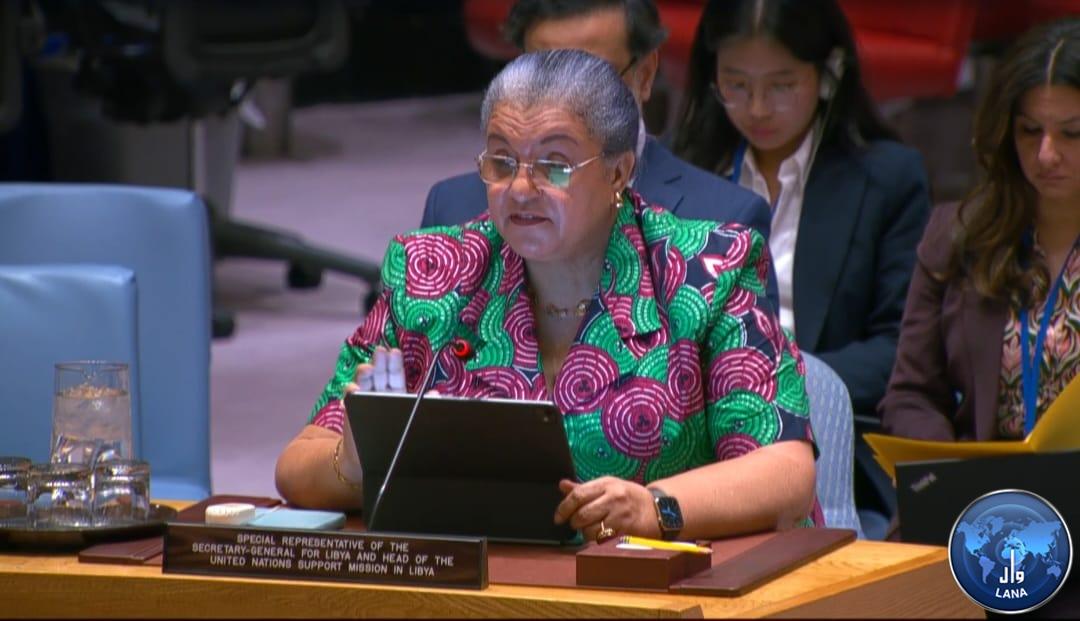Tetteh in a newspaper article: Protecting civilians, justice and accountability are a priority for Libya.
Pulbished on:
Tripoli, May 21, 2025 (LANA) - The head of the United Nations Support Mission in Libya (UNSMIL), Hannah Tetteh, said that recent events in Libya have once again exposed the continued failure of security actors and other parties to adhere to international humanitarian law and international human rights law, and underscore the urgent need to halt the cycles of violence and impunity.
In an article titled "Protecting Civilians, Justice, and Accountability: A Priority for Libya," published in the London-based Asharq Al-Awsat newspaper on Wednesday, Tetteh added that the blatant disregard for fundamental human rights is not only morally and legally shameful, but is also one of the primary drivers of the cycles of unrest and conflict that Libya has endured.
She continued, "Cases of enforced disappearance, arbitrary arrests and detention, and deaths in custody continue throughout Libya, and security actors allied with the ruling authorities throughout the country continue to target journalists, human rights defenders, political opponents, members of the judiciary, and other citizens." Hannah Tetteh explained that every disappearance is caused by a grieving family, desperate to find an answer, and often afraid to disclose what happened to them for fear of reprisal. She noted that many cases remain pending, from political activist Abdel Moez Banoun, who has been missing since 2014, to parliamentarian Siham Sergiwa, who was abducted in 2019. The fate of the missing continues to haunt their families.
The UN envoy pointed out that these violations may amount to war crimes and crimes against humanity, explaining that Libya's acceptance of the jurisdiction of the International Criminal Court over alleged crimes committed on its territory from 2011 to late 2027 is a step in the right direction and must be accompanied by concrete measures, including full cooperation on outstanding arrest warrants and the surrender of individuals wanted by the court.
In her article, Tetteh referred to leaked photos from both official and unofficial detention centers, including the Qarnada Center and the Abu Salim Zoo. The footage showed detainees being subjected to abuse, beatings, and torture in inhumane conditions. She also noted the horrific images of Parliament member Ibrahim al-Darsi, who has been missing for more than a year, chained.
The article also addressed the events that took place in Tripoli last week, stating that it is regrettable that these clashes have had a devastating impact on civilians. Many people have been killed and others injured, while buildings have suffered extensive damage, including protected infrastructure such as hospitals. Schools and universities have been closed, and flights have been halted.
The UN envoy noted that following the clashes, thousands of Libyans demonstrated in the streets of Tripoli, demanding political change and the withdrawal of armed groups from the capital. Some demonstrations were met with excessive force and violence, and one demonstrator and a police officer were confirmed killed. There were also reports of a greater number of injuries and acts of violence. She said that these events underscore the urgent need to guarantee basic rights to freedom of expression and assembly, and the need to protect civic space.
According to Tetteh, fourteen years after the outbreak of the February 17 Revolution, Libya remains mired in a legacy of rampant, unchecked violence. Human rights violations continue unabated and have become a normal occurrence, fueling resentment, exacerbating rifts, and undermining national reconciliation.
She emphasized that continued impunity leads to a loss of public confidence, the erosion of institutions, and the obstruction of Libya's democratic transition, including the prospects for free and fair elections. She emphasized that consolidating the rule of law requires strong and independent judicial institutions, along with structural reforms to establish a security apparatus that serves citizens and respects the human rights of all.
According to the article, the United Nations Support Mission in Libya intends to launch a political process soon to consult with Libyans on a roadmap leading, among other things, to the formation of a single government mandated by the people, respecting fundamental human rights and freedoms, including economic and social rights.
The UN envoy said that the recently reached truce, which ended the conflict that erupted last week between armed groups in Tripoli, is a critical opportunity for a new beginning. This must be a permanent and unconditional ceasefire centered on the protection of civilians and respect for international humanitarian and human rights law.
UN envoy Hannah Tetteh concluded her article by stating that the mission will mobilize resources to support this goal. Protecting civilians is not a political option; it is a legal duty, a national necessity, and a compass that will guide Libya toward peace, stability, and prosperity.




